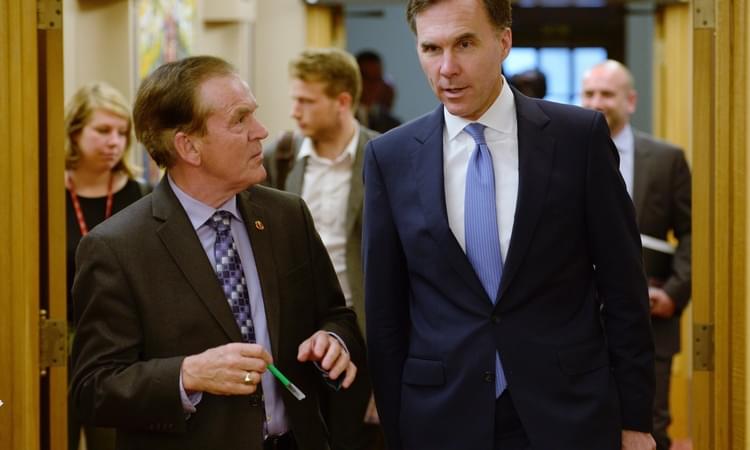Greying provinces deserve larger health transfers: Senate report – Daily Gleaner – 6 July 2017

Article by Adam Huras
Photo by Adrian Wyld
In the midst of studying the impact of health-care costs on the country’s fastest-aging populations, New Brunswick Sen. Percy Mockler accidentally became the case study.
Spending a weekend lugging around cinder blocks to build a new garden bed for his wife Susan at their St. Leonard home, Mockler pinched a nerve in his shoulder.
“At 68 years old, I have now been to see the doctor more often than in the rest of my life,” Mockler said in an interview. “Since the beginning of June I’ve been to four different doctors, I’ve being doing some physiotherapy.
“In the past, I have visited a lot of people in hospitals, friends of mine, constituents since 1982, but for me to use it, it’s a prime example of how previously my cost to the system was miniscule compared to what I’m using now.”
The Senate committee that Mockler chairs in Ottawa has now released a report recommending that greying provinces need larger health transfers from Ottawa to offset the rising cost of care.
Dr. Dennis Furlong, a New Brunswick physician and former politician, told the committee that the average annual health-care spending for a person over 65 years now stands at $11,635.
Meanwhile, for a person between 15 and 64, it’s only $2,663.
The physician and former politician said that could raise health-care costs across the country by $2 billion annually.
New Brunswick
The math is particularly concerning in New Brunswick.
New census data released earlier this year shows that New Brunswick has 25,150 more seniors than it did five years ago.
That’s currently 19.92 per cent of the province’s population – 148,785 out of 747,100 in total – that are 65 years old or older.
If recent trends continue, roughly 31 per cent of New Brunswick’s total population will be 65 years old or older by 2031, according to Statistics Canada.
The added fiscal cost? Another 82,815 seniors with higher medical costs piled onto an already $2.7-billion provincial health-care budget.
Report recommendations
The new Senate report, titled Getting Ready: For a New Generation of Active Seniors, tabled by the Senate standing committee on national finance, makes the central recommendation that federal payments transfer to the provinces and territories need to be changed to take into account aging populations, which are unevenly distributed across the country.
While about one in five New Brunswickers currently 65 year old or older, it’s a lot different elsewhere.
Alberta has the lowest percentage of senior of any province with 12.3 per cent of its population 65 years old or older.
The same transfer formula is used across the province.
The report also recommends the creation of a national seniors’ strategy that aims to control spending growth while ensuring seniors get appropriate and accessible care.
It also calls for new measures to keep seniors at home longer, as well as increase the labour force participation of underrepresented groups, including Indigenous peoples and people with disability, in order to slow a growing shortfall of workers due to retirements.
Health transfers
New Brunswick decided to go it alone, to the initial ire of other provinces, to strike its own health care spending deal with the federal government late last year after the provinces and territories rejected an offer for a new 10-year national health accord.
Premier Brian Gallant said the deal was essential to avoid missing out on available dollars for mental health and home care programs. It unlocked $230 million in additional funding over 10 years for those two specific initiatives.
The province has home care strategies at the ready, but needed money to ramp it up.Nearly all of the other provinces have followed suit.
The Gallant government has repeatedly offered up New Brunswick to be the home of a federal pilot project in search of best practices to keep seniors healthy and in their homes.
The federal government didn’t respond to a request on Thursday for comment.
Mockler said that top ups to health transfers to provinces with aging populations could come in the form of expanded extramural services to keep seniors in their homes and out of hospital beds.
Health Minister Victor Boudreau told the Telegraph-Journal in an interview that the details of exactly where new dollars for mental health and home care will be spent are still being negotiated.
But only $6 million of that $230 million will be transferred to the province in the current fiscal year.
That will be applied to scaling up existing Home First initiatives to keep seniors living in their homes.
“We’re in the process now of finalizing those agreements, but the idea of New Brunswick becoming a pilot project or a living lab [to test new senior care initiatives], those discussions are still ongoing,” Boudreau said. “They haven’t said no, but they haven’t said yes either.”